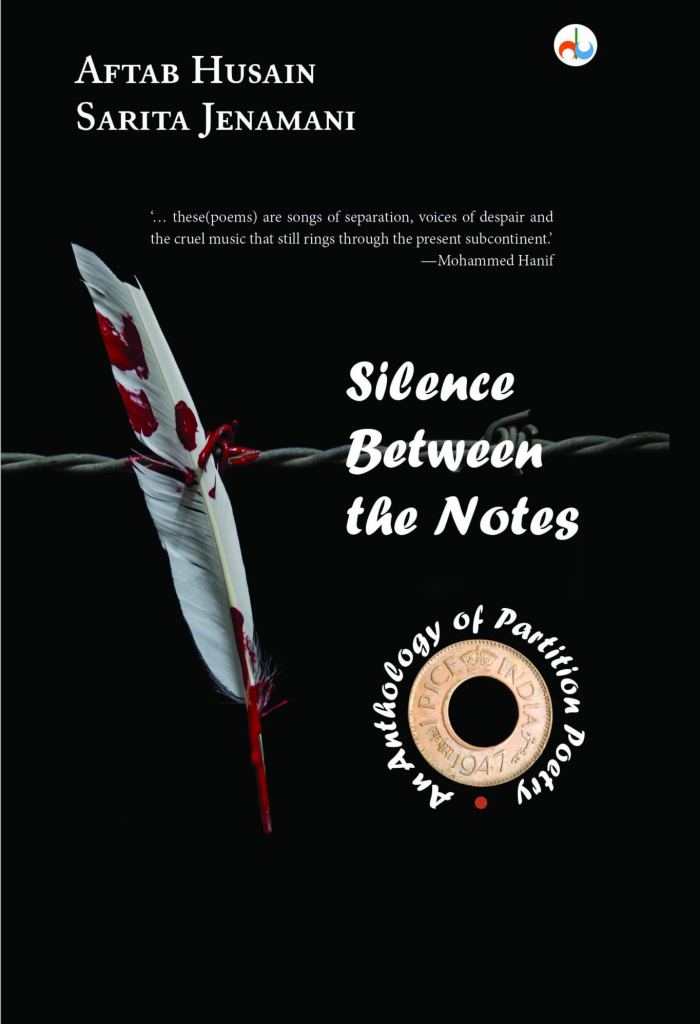Title: Silence between the Notes – Anthology of Partition Poetry
Selected, edited and introduced by Aftab Husain and Sarita Jenamani
Despite being more than seven decades old, Partition continues to be raw and unflinching. Endless books and movies have tried to capture its pain and enigma and yet there seems to be so much more that needs to be told about that one incident that changed so many lives, forever.
Silence between the Notes is an anthology of Partition poetry which includes contributions from Urdu, Punjabi, Sindhi, English, Hindi, Bengali and Kashmiri languages. It is a unique collection as this is the first book which is extensive, representative and inclusive of it all. Selected, edited and introduced by Aftab Husain and Sarita Jenamani, this anthology promises to bring forward the voices which had perhaps got lost somewhere in all the noise that followed Partition.
Sarita Jenamani is a poet based in Vienna who writes in English, Hindi and Odia, her mother tongue. A general secretary of the Austrian chapter of PEN international, she is also the co-editor and publisher of the bilingual literary magazine Words and Worlds.
An eminent name on modern Ghazal poetry from South Asia, Aftab Husain writes in Urdu, English and German. His poems have been translated into many languages. Apart from being a member of the Austrian chapter of PEN international, he is also the co-editor of the bilingual literary magazine, Words and Worlds.
When India was declared independent, the joyous news was also followed by the sad news of Partition of India into two countries, India and Pakistan. What followed was mass migration of lakhs of people as Muslims in India migrated to Pakistan while Hindus and Sikhs in Pakistan migrated to India, all in a hope for better tomorrow. Nobody knew how this supposed call for betterment led to so much blood shed on both the sides that till date, the cries and blood stains can be heard and seen. Was it religion or was it politics, no one can say! All one can say is that the wound is too deep for even time to heal it.
‘My soul quivered at the sight of human blood, spilled here and there
Like beasts, men madly roamed at city’s every thoroughfare.’
(‘The Partition’, Maikash Ambalvi)
Picking up gems from different languages ranging from Urdu and Kashmiri to Bengali and Sindhi, this collection of ninety-one poems is a heart-wrenching read. One cannot read this collection without feeling that pinch in their heart and sensing a lump in their throat on this poignant portrayal of the incidents that happened before, on and after Partition. The beauty, irrespective of the language they were written in and despite being translated, leaves one unnerved.
With works of stalwarts like Sahir Ludhianvi, Faiz Ahmed Faiz, Amrita Pritam, Agha Shahid Ali, Taslima Nasreen, Keki Daruwalla and many others featured therein, these poems are strung together with the thread of hope binding them. Taking us through the conflict they witnessed, heard or experienced, the poems in this collection make you witness the trauma inflicted upon through Partition. One can almost hear the sobs and feel that fear undergone through these pages.
Even in some of the darkest stanzas it is difficult to miss the tiny glimmer of hope in the hearts of the poets. Like that ladies who tied pillows on their waists and stomachs to protect themselves, or the one where they talk about how trains arrived at stations but the names of the places had been changed, leaving them unidentifiable. These poems talk endlessly about kind neighbours who took them in and protected them or that random stranger who had offered them food. There might be pain in their words and through ink, they might be giving form to their blood and tears shed at that time. However, their voices are trying hard to hold onto hope. As Sarita Jenamani’s poem, ’70 years later’ begins,
‘August is the cruelest month
It drags us
To a butchery
Plastered with mirrors-
Mirrors of the ancestral rage’
And ends with,
‘August in a month of monsoon
And monsoon brings
A maze of hope’
If someone were to ask, whom did the Partition benefit, there would be pin-drop silence in response. This is the same eerie silence that reflects out in the title of the book ‘Silence between the notes’. Each poem, each stanza, every word is followed by a pause which is reverberating with questions but sadly, has no answers. This silence is also reminiscent within the moments when the reader pauses reading the book briefly after finishing one poem, just to regain composure and start reading it again.
Today, almost seventy years later, we are still at a point where the harsh memories of this incident have chained us and sadly, there are times, when we see the signs of it reoccurring around us clearly pushing us further down the abyss. The only thing that helps us stay afloat is that we have hope, for a better tomorrow, for a kinder world and for humanity to prevail above it all.

Namrata is a lost wanderer who loves travelling the length and breadth of the world. She lives amidst sepia toned walls, fuchsia curtains, fairy lights and shelves full of books. When not buried between the pages of a book, she loves blowing soap bubbles. A published author she enjoys capturing the magic of life in her words and is always in pursuit of a new country and a new story. She can be reached at [email protected].
Originally published by Borderlessjournal.com
SIGN UP FOR COUNTERCURRENTS DAILY NEWS LETTER










































